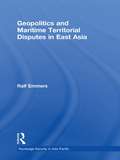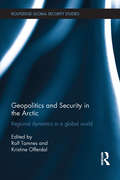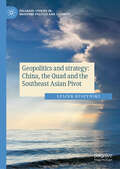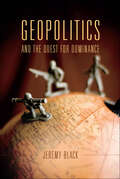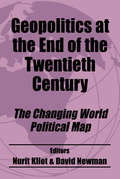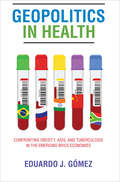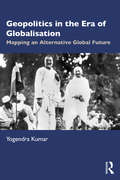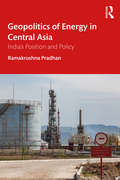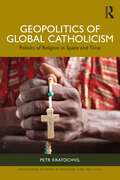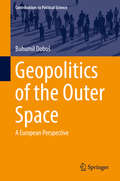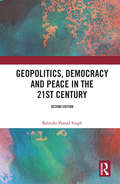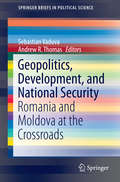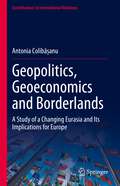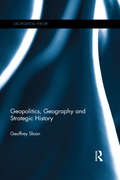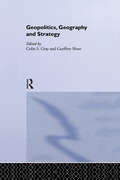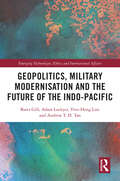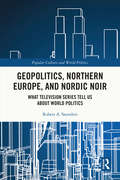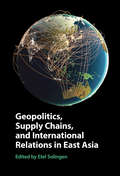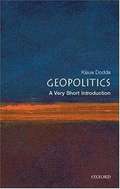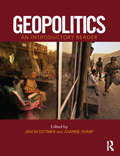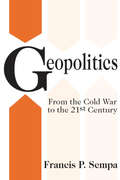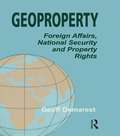- Table View
- List View
Geopolitics and Maritime Territorial Disputes in East Asia (Routledge Security in Asia Pacific Series)
by Ralf EmmersGeopolitics is a crucial element in understanding international relations in East Asia, with major and medium powers competing for influence. This book examines geopolitics in East Asia, focusing in particular on its major, contentious maritime territorial disputes. It looks in particular detail at the overlapping claims between Japan, China and Taiwan over the Senkaku/Diao yu Islands in the East China Sea as well as the Paracel Islands claimed by China, Taiwan, and Vietnam and the Spratly Islands involving Brunei, China, Malaysia, the Philippines, Taiwan, and Vietnam in the South China Sea. The book offers a comparative study of the East and South China Seas by arguing that their respective circumstances are influenced by similar geopolitical considerations; factors such as territory, natural resources and power competition all impact on disputes and broader regional relations. It is precisely the interplay of these geopolitical forces that can lead to the rapid escalation of a maritime territorial dispute or reversely to a diffusion of tensions. The book considers how such disputes might be managed and resolved peacefully, despite the geopolitical conditions that can make co-operation on these issues difficult to achieve. Ralf Emmers examines the prospect for conflict management and resolution by identifying catalysts which may contribute to improving the climate of relations.
Geopolitics and Security in the Arctic: Regional dynamics in a global world (Routledge Global Security Studies)
by Rolf Tamnes Kristine OfferdalWritten by a group of leading experts on Artic affairs, this book offers a historically informed and comprehensive study of the geopolitics and security challenges of the Arctic. The key aim of the work is to identify the conditions for cooperation, stability and peace in the Arctic and to reach beyond simple description and expectation in order to explore in depth some of the main factors that will determine the future of international relations in the region. Furthermore, it addresses key topics such as the geopolitical significance of the Arctic and the importance of oil and gas resources in the Arctic. The book also investigates what the main characteristics of governance in the Arctic are, and how institutions and regimes can promote stability and security in the region. The volume maintains two layers of focus. The first relates to the dynamics within the Arctic and the second to developments outside the region, highlighting that we cannot understand the Arctic in isolation from global developments such as energy markets, security conflicts and NATO-Russian antagonism. This book will be of much interest to students of Arctic politics, security studies, geopolitics, Russian and Scandinavian politics, and international relations in general.
Geopolitics and strategy: China, the Quad and the Southeast Asian Pivot (Palgrave Studies in Maritime Politics and Security)
by Leszek BuszynskiChina seeks geopolitical space in the Western Pacific . The spearhead of China's expansion is the navy which is now the world's largest with an expanding carrier force to enforce its maritime claims in the South China Sea and elsewhere. The geopolitical pivot for China is Southeast Asia. In view of China's constricted maritime geography, Southeast Asia is the one place that can provide access for its expanding navy allowing China to expand in different directions. Control of this region would deprive the US of a positional advantage in the Western Pacific, It would divide the Indo Pacific into two sections, the Indian Ocean and the Western Pacific., separating Japan from India and nullifying the Quad grouping which brought together the US, Japan, Australia and India to counter Chinese expansionism. Because of its strategic value, Southeast Asia has become a key region in the rivalry between China and the US with its partners in the Quad. However, Southeast Asia is a region of great diversity and some countries would side with China while others would resist it. Whether China can achieve control of this region is of great concern to the US and the Quad as it relates to Chinese long term ambitions and its challenge not just to the region but to the global order.
Geopolitics and the Anglophone Novel, 1890-2011
by John MarxLiterary fiction is a powerful cultural tool for criticizing governments and for imagining how better governance and better states would work. Combining political theory with strong readings of a vast range of novels, John Marx shows that fiction over the long twentieth century has often envisioned good government not in Utopian but in pragmatic terms. Early-twentieth-century novels by Joseph Conrad, E. M. Forster and Rabindrananth Tagore helped forecast world government after European imperialism. Twenty-first-century novelists such as Monica Ali, Chimamanda Ngozi Adichie, Michael Ondaatje and Amitav Ghosh have inherited that legacy and continue to criticize existing policies in order to formulate best practices on a global scale. Marx shows how literature can make an important contribution to political and social sciences by creating a space to imagine and experiment with social organization.
Geopolitics and the Great Powers in the 21st Century: Multipolarity and the Revolution in Strategic Perspective (Geopolitical Theory)
by C. Dale WaltonThis book argues that in the twenty-first century Eastern Eurasia will replace Europe as the theatre of decision in international affairs, and that this new geographic and cultural context will have a strong influence on the future of world affairs. For half a millennium, the great powers have practised what might be called ‘world politics’, yet during that time Europe, and small portions of the Near East and North Africa strategically vital to Europe, were the ‘centres of gravity’ in international politics. This book argues that the ‘unipolar moment’ of the post-Cold War era will not be replaced by a US-China ‘Cold War’, but rather by a long period of multipolarity in the twenty-first century. Examining the policy goals and possible military-political strategies of several powers, this study explains how Washington may play a key role in eastern Eurasian affairs if it can learn to operate in a very different political context. Dale Walton also considers the rapid pace of technological change and how it will impact on great power politics. Considering India, China, the US, Russia, Japan, and other countries as part of a multipolar system, he addresses the central questions that will drive US policy in the coming decades. Geopolitics and the Great Powers in the 21st Century will be of interest to students of international security, military history, geopolitics, and international relations.
Geopolitics and the Quest for Dominance
by Jeremy BlackHistory and geography delineate the operation of power, not only its range but also the capacity to plan and the ability to implement. Approaching state strategy and policy from the spatial angle, Jeremy Black argues that just as the perception of power is central to issues of power, so place, and its constraints and relationships, is partly a matter of perception, not merely map coordinates. Geopolitics, he maintains, is as much about ideas and perception as it is about the actual spatial dimensions of power. Black's study ranges widely, examining geography and the spatial nature of state power from the 15th century to the present day. He considers the rise of British power, geopolitics and the age of Imperialism, the Nazis and World War II, and the Cold War, and he looks at the key theorists of the latter 20th century, including Henry Kissinger, Francis Fukuyama and Samuel P. Huntington, Philip Bobbitt, Niall Ferguson, and others.
Geopolitics at the End of the Twentieth Century: The Changing World Political Map (Routledge Studies in Geopolitics #No. 2)
by David Newman Nurit KliotAn excellent examination of how the collapse of the Soviet Union and the impact of globalization have brought about changes not only to the territorial configuration sovereignty of states and their boundaries, but also to traditional notions of state, boundaries, sovereignty and social order These essays focus on the key regional and geopolitical characteristics of this global reordering, with an emphasis on Eastern Europe and South Asia. They discuss the territorial reordering which is taking place at the level of the state as boundaries are redemarcated in line with ethno-territoral demands; as borders are transversed by the movement of peoples, information and finance; and as the lines of territorial demarcation are perceived not only in terms of their fixed characteristics but as part of a process through which regional and ethnic identities continue to be formed and reformed. Each section ends with articles which focus on literature on geopolitics and boundaries. This is an invaluable addition to our understanding of contemporary world affairs.
Geopolitics in Health: Confronting Obesity, AIDS, and Tuberculosis in the Emerging BRICS Economies
by Eduardo J. GómezAn in-depth analysis of why leaders from the BRICS respond to public health emergencies the way they do.In recent years, political leaders in Brazil, Russia, India, China, and South Africa, collectively known as the BRICS, have worked to reformulate international discussions and policies on issues ranging from fair and free trade to human rights. When it comes to health epidemics, however, the BRICS have differed greatly in terms of how—and when—they respond, highlighting important differences in their political commitment to meeting healthcare needs.In Geopolitics in Health, Eduardo J. Gómez takes a critical look at how the emerging BRICS economies dealt with the obesity, AIDS, and tuberculosis epidemics. Despite the countries having similar international political and economic ambitions, Gómez finds that domestic policy responses were driven mainly by international, as opposed to domestic, pressures and interests. Using a theoretical framework called geopolitical positioning, Gómez explores how nations respond to international pressures and policy criticisms, as well as offers of financial and technical assistance; countries then utilize domestic policy innovations and ultimately engage in global health diplomacy in order to bolster their international reputation.Gómez draws on extensive data and case studies and argues that leaders aspiring to build their reputations among elite nations have a ready way to demonstrate their status through quick and effective public health responses; those who scorn the international community tend to react slowly and ineffectively to the same type of crises. The first book of its kind to conduct an in-depth comparative historical analysis of how the BRICS deal with public health threats, this pathbreaking text demonstrates the value of positive geopolitical positioning and strong partnerships with other governments, nongovernmental organizations, and social health movements.
Geopolitics in the Era of Globalisation: Mapping an Alternative Global Future
by Yogendra KumarThis book presents an alternative roadmap for a world characterised by geopolitical uncertainty. The surging expectations about a future world of democratic values and high economic growth, born out of superpower bonhomie at the end of the Cold War, did not lead to the promised outcomes. Instead we are faced with deeply destabilising challenges, like climate change, widespread state fragility, terrorism, arms race, disruptive newer technologies, global economic volatility, and ineffectiveness of multilateral institutions, old and new. The volume: surveys the intellectual discourse, the attempts to redesign the global institutions, and the geopolitical trends since the end of the Cold War for an understanding of the contemporary geopolitics, analyses the characteristics of the contemporary geopolitics, the seeming intractability of the global challenges, and the ongoing discourse about preventing their further deterioration, foregrounds the Gandhian praxis and IR theory for managing power transitions anchored in non-violent mobilisation of empowered masses, ensuring institutional resilience, and illustrates them through ongoing conflicts in Iraq and Afghanistan, outlines an approach, based on the Gandhian experience of managing political change, towards conflict, geopolitical uncertainties, and institutional ineffectiveness for securing a better future globally, including South Asia. Accessibly written, this volume will be indispensable for foreign policy experts, government think tanks, and career bureaucrats. It will also be essential for scholars and researchers of international relations, foreign policy, politics, and governance and public policy.
Geopolitics of Energy in Central Asia: India's Position and Policy
by Ramakrushna PradhanThis book focuses on the geopolitics of Central Asia which has emerged as the new fertile ground for oil and energy resources. It analyses the scramble for energy and control over the region by many nations and their diplomatic manoeuvrings to ensure energy sufficiency and economic growth. The book provides a quantitative analysis of the Central Asian energy potential and offers an understanding of the unique position that each country occupies in the geopolitics of oil and energy in the region. It looks at aggressive foreign policies by countries like the US, China, the European Union, Japan, Israel, Iran and Pakistan, focusing primarily on India’s position and strategies in the region within the new great game. The book further examines the dynamics between Central Asia and India and India’s policies for geopolitical engagement and diversification of energy sources. This volume will be of interest to researchers and students of political studies, international relations, economics, sociology, and Asian studies. It will also be useful for policymakers and professionals working in the field of energy security and geo-economics.
Geopolitics of European Union Enlargement: The Fortress Empire (Routledge Research in Transnationalism)
by James Anderson Warwick ArmstrongUnder the impact of accelerated globalization, transnational integration and international security concerns, the geopolitics of Europe's borders and border regions has become an area of critical interest. The progressive enlargement of the EU has positioned its borders at the heart of recent discussions on the changing nature of the EU, the meaning of 'Europe' and what constitutional shape a more politically unified Europe might take.With enlargement, the EU must elaborate strategies to contend with a fiercely competitive world - and to build fortress-like defences against perceived tensions arising from greater cultural mixing and threats such as terrorism. The authors build up an integral picture of the EU's internal and external borders and borderlands to reveal the processes of re-bordering and social change currently taking place in Europe. They explore issues such as security, immigration, economic development and changing social and political attitudes, as well as the EU's relations with the Islamic world and other world powers. The book embraces an array of disciplinary, ideological and theoretical perspectives, offering detailed case studies of different border regions and the concerns of the local inhabitants, while engaging in broader discussions of developments across Europe, state policies and the EU's relations with neighbouring states.Geopolitics of European Union Enlargement will be of key interest to students and researchers in the fields of European politics, geography, international studies, sociology and anthropology.
Geopolitics of Global Catholicism: Politics of Religion in Space and Time (Routledge Studies in Religion and Politics)
by Petr KratochvílGeopolitics of Global Catholicism uncovers the key trends in today’s Catholicism, providing an incisive analysis of its deep entanglement with national, regional, as well as global politics.This book offers an exciting exploration of five versions of local Catholicism(s) and sheds light on the various theo-political constellations that not only differ widely across these national contexts but also have global geopolitical consequences. It is built around a novel theoretical argument showing that Catholic geopolitics contains not only a spatial dimension (as classic geopolitical studies would have it) but also a temporal one. As a consequence, the Catholic role in the world cannot be simply understood as a result of the spatial expansion of the Church but rather as a result of the complex relationships between Catholicism and colonization, inculturation, backwardness, and modernization(s). To counter the lingering Eurocentrism of most studies of the Catholic Church, this book’s case studies explore Catholic geopolitics in five non-European contexts, focusing mainly on the Global South (plus the United States): Latin America (Brazil), North America (the United States), Asia (India and China), and Africa (the Democratic Republic of the Congo). These case studies also show that the successes and failures of Catholicism cannot be explained by a recourse to a single, top-down interpretation of Catholic geopolitics, but rather by exploring the various Catholic spatio-temporal constellations on the global, regional, and local levels. With the accelerating diversification of the Church and the growing role of the Global South, these local and regional influences gain further importance as they are likely to increasingly define the future of Catholicism.This book will be of utmost interest to scholars of International Relations, Religious Studies, Political Science, and Theology, as well as Geopolitics, especially to those studying the global rise of religion. Its accessible language will also appeal to the wider public beyond academia, especially those interested in global Christianity, as well as church leaders, and members of Catholic organizations.
Geopolitics of the Outer Space: A European Perspective (Contributions to Political Science)
by Bohumil DobošThis book presents a comprehensive geopolitical analysis of European space activities. By studying outer space as a physical and socio-economic space as well as a military-diplomatic area, the author helps readers understand outer space as a geopolitical environment. The book also offers insights into the behavior and strategies of different actors, with a special focus on the European space strategy and the nature of the European space program and diplomacy.
Geopolitics, Democracy and Peace in the 21st Century
by Balmiki Prasad SinghThis book examines a wide range of issues that are expected to play a dominant role in shaping the 21st century. Delineating key concerns in geopolitics, democracy and peace, it studies the functions and influences of educational institutions, progressive religious and social groups, communities, international institutions such as the United Nations (UN); and forums promoting inter-faith dialogue. The author underscores how the century may be forged by a pluralist ethos: multiple and diverse nation states, centres of power, faiths, cultures, economies, and languages. He stresses the need to nurture moral strength and enlightened leadership for a life of compassion, peace and holistic development. In his second edition, the author further examines what the future holds for democracy. The volume takes stock of the recent developments in world politics, and highlights the urgent need for the Bahudha approach — inculcating a culture of dialogue and debate for peaceful resolution of conflicts. Lucid and engaging, this book will interest scholars and researchers of political studies, international relations, public policy, governance and development studies.
Geopolitics, Development, and National Security
by Andrew R. Thomas Sebastian VaduvaThis volume focuses on the spotlight on Romania and Moldova, two distinct nations that share a common language, history and culture. Romania is a NATO member since 2004 and a fully integrated nation into the European Union since 2007, while The Republic of Moldova (a former Soviet republic) is attempting to join both international organizations for security and development reasons. Ever since the Iron Curtain fell on Europe at the end of World War II, the term "Eastern Europe" has been used without much regard for the diversity of the region. Given the geographical proximity, perhaps this is an understandable error. However, moving forward into the twenty-first century, and considering the highly sensitive geopolitical, security and development issues playing out in the region, we believe each nation should be treated with the unique distinction it deserves. Building a mosaic of the most current research, practical application, and policy, the authors, who represent unique, insider perspectives, cover a range of emerging and timely topics from Black Sea security to cultural analyses, organizational development and risk assessment shedding light on social, political and economic challenges of rapid transition in the region, while considering the implications for research, practice and policy in other front-line regions around the world.
Geopolitics, Geoeconomics and Borderlands: A Study of a Changing Eurasia and Its Implications for Europe (Contributions to International Relations)
by Antonia ColibășanuThis book discusses the emerging threats to European stability in different borderland regions, from the Greater Middle East to the Eastern Mediterranean, the Balkans and the Black Sea. It highlights the specific geopolitical risks that could, left unchecked, have global repercussions. The book shows how recent events have exasperated underlying problems that have been slowly destabilizing each of these regions for years. It also looks at the geopolitical constraints and objectives of the countries within these regions to build a basis for understanding their current and future security challenges. While doing so, the book discusses the European borderlands in a non-traditional way, proposing a specific framework to study them, going beyond historical analysis and employing a heuristic process and in-depth socio-economic analysis to understand regional power relations and trends. It develops the key concepts of "core borderland" and "geopolitical node" to understand the future challenges that Europe in particular and Eurasia, in general, will face, discussing specific features shaping current affairs and identifying the main drivers - countries and specific regional elements - for the future stability of the borderlands. This book will appeal to students and scholars of international relations, as well as policy-makers, practitioners, and international organizations interested in a better understanding of current and future challenges at Europe's borderlands and the security risks the European continent faces.
Geopolitics, Geography and Strategic History (Geopolitical Theory)
by Geoffrey SloanThis volume examines geopolitics by looking at the interaction between geography, strategy and history. This book addresses three interrelated questions: why does the geographical scope of political objectives and subsequent strategy of states change? How do these changes occur? Over what period of time do these changes occur? The theories of Sir Halford Mackinder and Nicholas Spykman are examined in order to provide an analytical narrative for five case studies, four historical and one contemporary. Taken together they offer the prospect of converting descriptions of historical change into analytic explanations, thereby highlighting the importance of a number of commonly overlooked variables. In addition, the case studies will illuminate the challenges that states face when attempting to change the scope of their foreign policy and geo-strategy in response to shifts in the geopolitical reality. This book breaks new ground in seeking to provide a way to understand why and how the geographical scope of political objectives and subsequent strategy both expands and contracts. This book will be of much interest to students of geopolitics, strategic studies, military history, and international relations.
Geopolitics, Geography and Strategy
by Colin S. Gray Geoffrey SloanGeopolitical conditions influence all strategic behaviour - even when cooperation among different kinds of military power is expected as the norm, action has to be planned and executed in specific physical environments. The geographical world cannot be avoided, and it happens to be 'organized' into land, sea, air and space - and possibly the electromagnetic spectrum including 'cyberspace'. Although the meaning of geography for strategy is a perpetual historical theme, explicit theory on the subject is only one hundred years old. Ideas about the implication of geographical, especially spatial, relationships for political power - which is to say 'geopolitics'- flourished early in the twentieth century.Divided into theory and practice sections, this volume covers the big names such as Mackinder, Mahan and Haushofer, as well as looking back at the vital influence of weather and geography on naval power in the long age of sail (sixteenth to nineteenth centuries). It also looks forward to the consequences of the revival of geopolitics in post-Soviet Russia and the new space-based field of "astropolitics".
Geopolitics, Military Modernisation and the Future of the Indo-Pacific (Emerging Technologies, Ethics and International Affairs)
by Bates Gill Andrew T. Tan Adam Lockyer Yves-Heng LimThis book examines to what extent geopolitics explains the current wave of force modernisation in the Indo-Pacific region. Examining the leading Indo-Pacific nations in terms of defence spending: the United States, China, India, Japan, South Korea, Australia, Taiwan, Singapore, Pakistan, Indonesia and Thailand, geopolitical principles are used to create hypotheses that can be tested against the military modernisation programmes of the major actors in the Indo-Pacific region. The book represents a bridge between reference works and the literature on international politics in the Indo-Pacific. The empirical chapters provide qualitative narratives that explore the force postures, military modernisation and procurement patterns of the cases, and assess why these nations’ military modernisation has followed particular courses and evaluate this evidence against the expectations of geopolitics and its rivals. This book will be a valuable addition to scholars, practitioners and, indeed, anyone interested in the future stability of one of the world’s most important and dynamic regions.
Geopolitics, Northern Europe, and Nordic Noir: What Television Series Tell Us About World Politics (Popular Culture and World Politics)
by Robert A. SaundersWith its focus on the popular television genre of Nordic noir, this book examines subtle and explicit manifestations of geopolitics in crime series from Scandinavia and Finland, as well as the impact of such programmes on how northern Europe is viewed around the world. Drawing on a diverse set of literature, from screen studies to critical International Relations, Geopolitics, Northern Europe, and Nordic Noir addresses the fraught geopolitical content of Nordic television series, as well as how Nordic noir as a genre travels the globe. With empirical chapters focusing on the interlinked concepts of the body, the border, and the nation-state, this book interrogates the various ways in which northern European states grapple with challenges wrought by globalisation, neoliberalism, and climate change. Reflecting the current global fascination with all things Nordic, this text examines the light and dark sides of the region as seen through the television screen, demonstrating that series such as Occupied, Trapped, and The Bridge have much to teach us about world politics. This book will be of interest to those interested in geopolitics, national identity, and the politics of popular culture in: Scandinavian studies, media/screen studies, IR/political science, human/cultural geography, sociology, anthropology, cultural studies, and communication.
Geopolitics, Supply Chains, and International Relations in East Asia
by Etel SolingenGlobal supply chains connect the world in unprecedented and intricate ways. Geopolitics, Supply Chains, and International Relations in East Asia dissects the sources and effects of contemporary disruptions of these networks. Despite their dramatic expansion as distinct, complex, and unique mechanisms of economic interdependence, the role of supply chains in broader patterns of interstate conflict and cooperation has been relatively neglected. This volume sheds light on whether a highly interdependent “Factory Asia” and Asia-Pacific can withstand geopolitical, geo-economic, and pandemic threats. This combustible mix, fueled by rising hyper-nationalism in the US and China, threatens to unleash sizable disruptions in the global geography of production and in the international relations of East Asia.
Geopolitics: A Very Short Introduction
by Klaus DoddsGeopolitics is a way of looking at the world: one that considers the links between political power, geography, and cultural diversity. In certain places such as Iraq or Lebanon, moving a few feet either side of a territorial boundary can be a matter of life or death, dramatically highlighting the connections between place and politics. Even far away from these 'danger zones' - in Europe or the US for example - geopolitics remains an important part of everyday life. For a country's location and size as well as its sovereignty and resources all affect how the people that live there understand and interact with the wider world. Using wide-ranging examples, from historical maps to James Bond films and the rhetoric of political leaders like Churchill and George W. Bush, this Very Short Introduction shows why, for a full understanding of contemporary global politics, it is not just smart - it is essential - to be geopolitical.
Geopolitics: An Introductory Reader (Critical Geopolitics)
by Jason Dittmer Jo SharpIt has been increasingly impossible to think about our changing world without coming across the term 'geopolitics'. In the wake of the invasion and occupation of Iraq by the United States, United Kingdom, and others, geopolitics has been offered as an explanation for the occupation's failure to reinvent the Iraqi state and as a blueprint for future action. But what is 'geopolitics'? Drawing both on academic and political material, this book introduces readers to the concept of geopolitics, from the first usage of the term to its more recent reconceptualisations. The concept of geopolitics is introduced through four thematic sections - Imperial Geopolitics, Cold War Geopolitics, Geopolitics after the Cold War and Reconceptualising Geopolitics. Each section includes key writings from a range of diverse and leading authors such as Said, Agnew, Dalby, O Tuathail, Gregory, Barnett and Kaplan, and is accompanied by a critical introduction by the editors to guide the reader through the material. This Reader establishes the foundations of geopolitics while also introducing readers to the continuing significance of the concept in the 21st century. This Reader provides an essential resource that exposes students to original writing. The Editors provide a pathway through the material with Section Introductions to assist the readers understanding of the context of the material and impacts of the writings. The readings included draw from a range of authors, writing from a range of locations. The Reader concludes with the latest changes in geopolitical thought, incorporating feminist and other perspectives.
Geopolitics: From the Cold War to the 21st Century
by Francis SempaWriters, observers, and practitioners of international politics frequently invoke the term "geopolitics" to describe, explain, or analyze specific foreign policy issues and problems. Such generalized usage ignores the fact that geopolitics as a method of understanding international relations has a history that includes a common vocabulary, well-established if sometimes conflicting concepts, an extensive body of thought, and a recognized group of theorists and scholars. In Geopolitics, Francis P. Sempa presents a history of geopolitical thought and applies its classical analyses to Cold War and post-Cold War international relations.While mindful of the impact of such concepts as "globalization" and the "information revolution" on our understanding of contemporary events, Sempa emphasizes traditional geopolitical theories in explaining the outcome of the Cold War. He shows that, the struggle between the Western allies and the Soviet empire was unique in its ideological component and nuclear standoff, the Cold War fits into a recurring geopolitical pattern. It can be seen as a consequence of competition between land powers and sea powers, and between a potential Eurasian hegemonic power and a coalition of states opposed to that would-be hegemony.The collapse of the Soviet empire ended the most recent threat to global stability. Acting as a successor to the British Empire, the United States organized, funded, and led a grand coalition that successfully countered the Soviet quest for domination. No power or alliance posed an immediate threat to the global balance of power. Indeed, the end of the Cold War generated hopes for a "new world order" and predictions that economics would replace geopolitics as the driving force in international politics. Russian instability, the nuclear dimension of the India-Pakistan conflict, and Chinese bids for dominance have turned the Asia-Pacific region into what Mahan called "debatable and debated ground." Russi
Geoproperty: Foreign Affairs, National Security and Property Rights
by Geoff DemarestSome innovations create new strategic property and new conflicts. Demarest argues that we have not reached the end of history and modern man will continue to fight over property as before, but the property will be of a post-modern character, such as electronic wavelengths and genetic codes.
